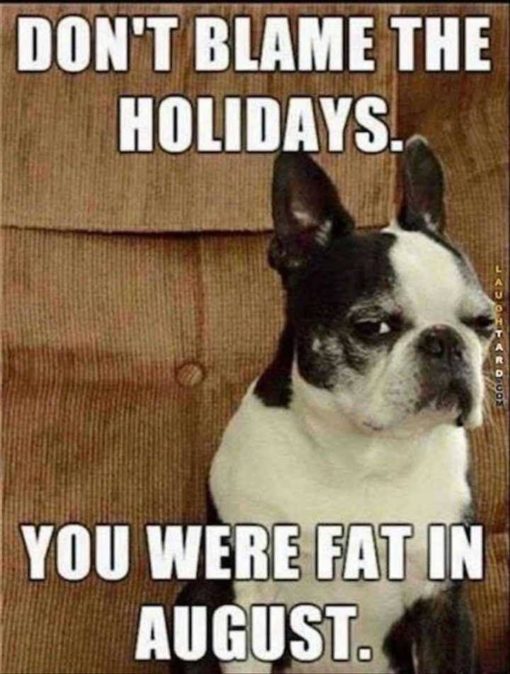DON T BLAME THE HOLIDAYS YOU WERE FAT IN AUGUST
The image displayed shows a black-and-white Boston Terrier with a somewhat surly, unimpressed expression. The dog is sitting with its head turned slightly to the side, allowing us to get a full view of its face. The background of the image is nondescript, featuring what appears to be a plain wooden surface.
At the top of the image, a caption in bold, white capital letters reads, "DON'T BLAME THE HOLIDAYS." This text is split into two lines to fit the compaction of the image, immediately setting a humorous tone even before the punchline is delivered. The starkness of the text color against the background ensures that it catches the viewer's attention.
Below the image of the dog and towards the bottom of the meme, the caption continues with "YOU WERE FAT IN AUGUST." This text is separated from the top line to create a comedic timing effect, a pause between the setup and the punchline. The punchline also uses large, bold capital letters, consistent with the meme format that seeks to convey a direct and blunt message.
The humor in the image arises from several factors. Firstly, the juxtaposition of the grumpy-looking dog with the frank and surprising text invokes a sense of bluntness often found in humor. It personifies the dog as if it is making a candid and humorous observation, which contrasts with the inherent innocence and non-judgmental nature of pets.
Secondly, the joke itself plays on the common theme of blaming holiday indulgences for weight gain, when in fact the implication is that the subject of the joke may have had concerns about their weight well before the holiday season began. This can elicit a chuckle because it's a relatable experience for many people who make excuses about their diet and weight, particularly around times known for feasting and celebrations.
Lastly, the meme might be considered humorous because it's a lighthearted poke at the denial we sometimes have about our own habits. Using the dog as the 'speaker' of the joke allows for a playful delivery that would likely be seen as too confrontational or mean-spirited if said by another person. Thus, it enables a moment of self-reflection wrapped in humor, which can be a catalyst for laughter among viewers. DON T BLAME THE HOLIDAYS YOU WERE FAT IN AUGUST
